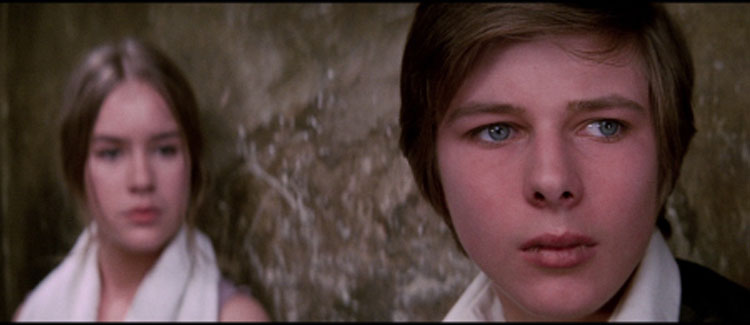Day 11 - "I am telling you that strange things happen here."

Not to pop my collar too hard or anything, but man, spending this SHOCKtober with the movies you all called favorites back in 2020 is really paying off for me. So far, I've watched things I'd been meaning to see forever, or movies chosen from the list because they just sounded cool. Today, though, I'm actually revisiting a film that I saw...oh, who knows how many years ago...and I didn't enjoy it! But in the who knows how many years since that first viewing, whenever I would see it mentioned anywhere I would say to myself, "I didn't like that? Really? Because it sure seems like something I should definitely dig..." But then I would shrug and move on to whatever adventure (or episode of Real Housewives) was waiting.
Well! Thanks to the one upstanding citizen-reader who voted it a fave, I have now finally revisited The House That Screamed (aka La residencia, 1969). Have my feelings about it changed? You won't have to wait long to find out!

HELL YEAH MY FEELINGS ABOUT IT HAVE CHANGED. (See, I told you you wouldn't have to wait long.) But! I also can see why I wasn't into it the first time around. But! What is this movie even about?
Picture it! 19th century France. Señora Fourneau (Lilli Palmer) rules a boarding school for teenage girls who are, shall we say, all various kinds of wayward with a well-mannered iron fist, quick to hand out punishments to the girls who rebel or break the rules. Sometimes they're tossed in isolation, where Fourneau tasks her protégé, lead student/narc Irene (Mary Maude) with doling out some whippings.

It's a miserable place to be stuck, but it livens up a bit when new girl Teresa (Cristina Galbó) arrives. Sweet-natured but reluctant to talk much about her family, Teresa catches the eye of Luis, Fourneau's weird, affable, "sickly" teenage son who spends a lot of time lurking about and spying on the girls.
Teresa and Luis eventually begin a quasi-relationship, meeting clandestinely whenever they can. Irene, bitter after her lesbian overtures were rejected, sets out to wreak emotional terror on Teresa. She hints to Fourneau that Teresa is fraternizing with her son, thus breaking one of the headmistress's cardinal rules. None of these girls could ever be good enough for Luis! He needs and deserves a woman who will love him and take care of him just like his mother does! (It worked out nicely for that Bates, family, right?)

After Irene subjects her to even more cruelty and humiliation, Teresa decides to run away, just as a few other unhappy girls have been rumored to do. Like those other girls, Teresa disappears...but Irene knows that she didn't actually run away. When she confronts Fourneau about it--well, it all leads to an ending that is simultaneously out of nowhere and not very surprising. But who cares, really, when the ending is almost an afterthought to this delightful, spooky, classily sleazy movie.
As much as I dug it this time around, I also understand why I wasn't so into earlier: it's billed as a slasher movie, and while technically I suppose it is--insomuch as a couple of people do die by slashing--there's more "action" on that poster up there than there is in the film itself. Co-writer/director Narciso Ibáñez Serrador (who also brought us the terrific Who Can Kill a Child?) is less concerned with killing off the girls one by one than he is with the politics and goings-on at Fourneau's school, which is a hotbed of hormones and sexual repression. And yet for as sexually charged it is, whips aside, surprisingly La residencia doesn't wallow in smut. Sometimes it's merely an uncomfortable patina of sleaze, as when Fourneau's gaze--both the mother's and the son's--lingers too long on the students as they shower. Other times, it's comedic, as when the needlework class gets all worked up, knowing that one lucky girl among them is out in the barn having it off with the man who...ahem...delivers the wood every couple of weeks.
Ultimately, it's more of a gothic thriller that dabbles in giallo territory on rare occasions. Having set aside my slashpectations and meeting the film on its own terms (imagine that!) I basked in the vibes. There aren't a lot of outright "horror" sequences, but the ones we get are rife with atmosphere and tension; the dark and stormy night when Teresa tries to escape is a highlight.
The other highlight here has got to be Irene and her journey from cruel That One Bitch to genuine heroine, who gives up everything to do what she knows is right. It's the rare arc that transforms a villain's villain into the star of the show, and I loved it.

I also loved seeing so many familiar faces from the world of Spanish horror, as the cast includes the likes of Maribel Martín of The Blood Spattered Bride (which you can listen to me talk about on The Evolution of Horror podcast right here!), Cristina Galbó of Let Sleeping Corpses Lie, and ubiquitous character actor Victor Israel, who featured in Horror Express, which fucking rules.
You know what else rules? The House That Screamed. Just like I've always said!